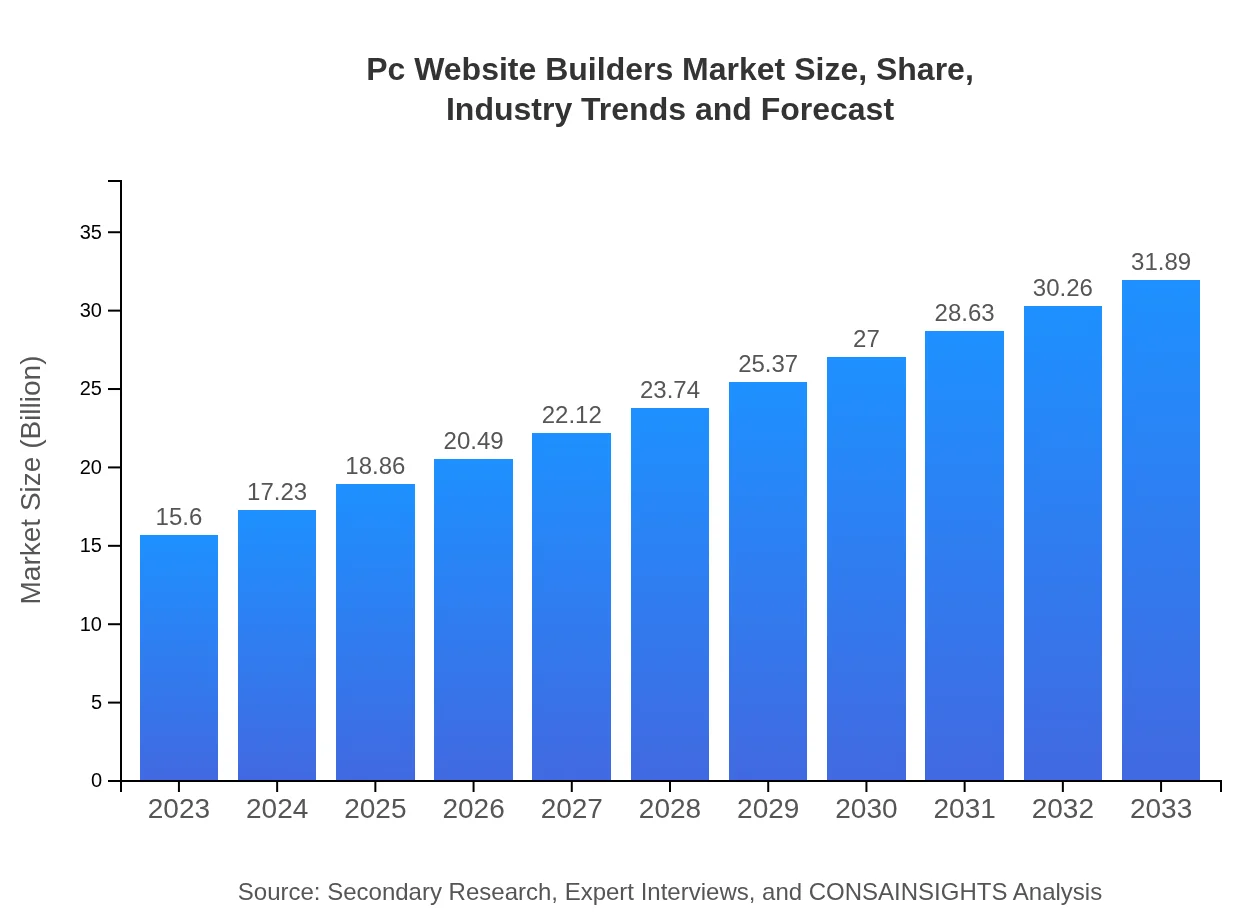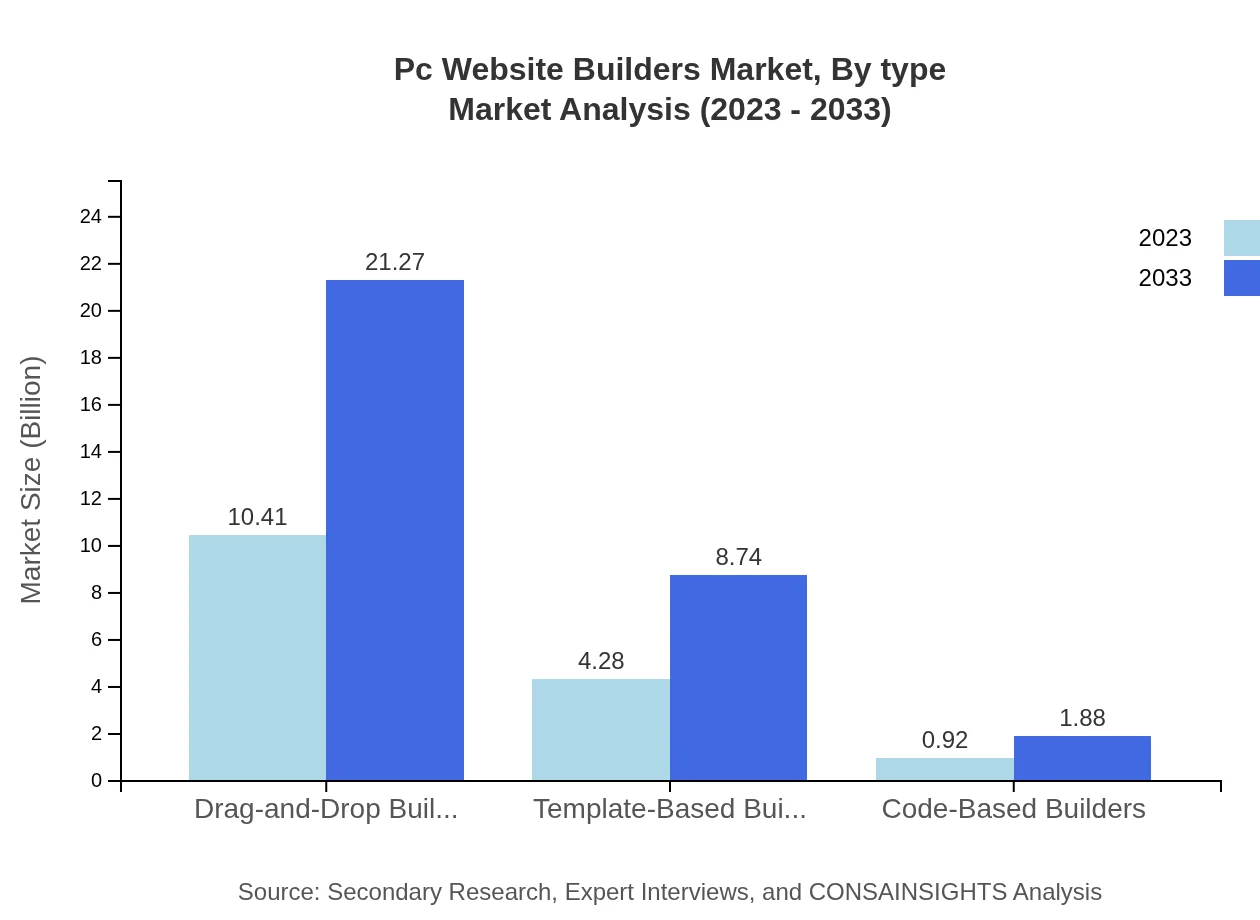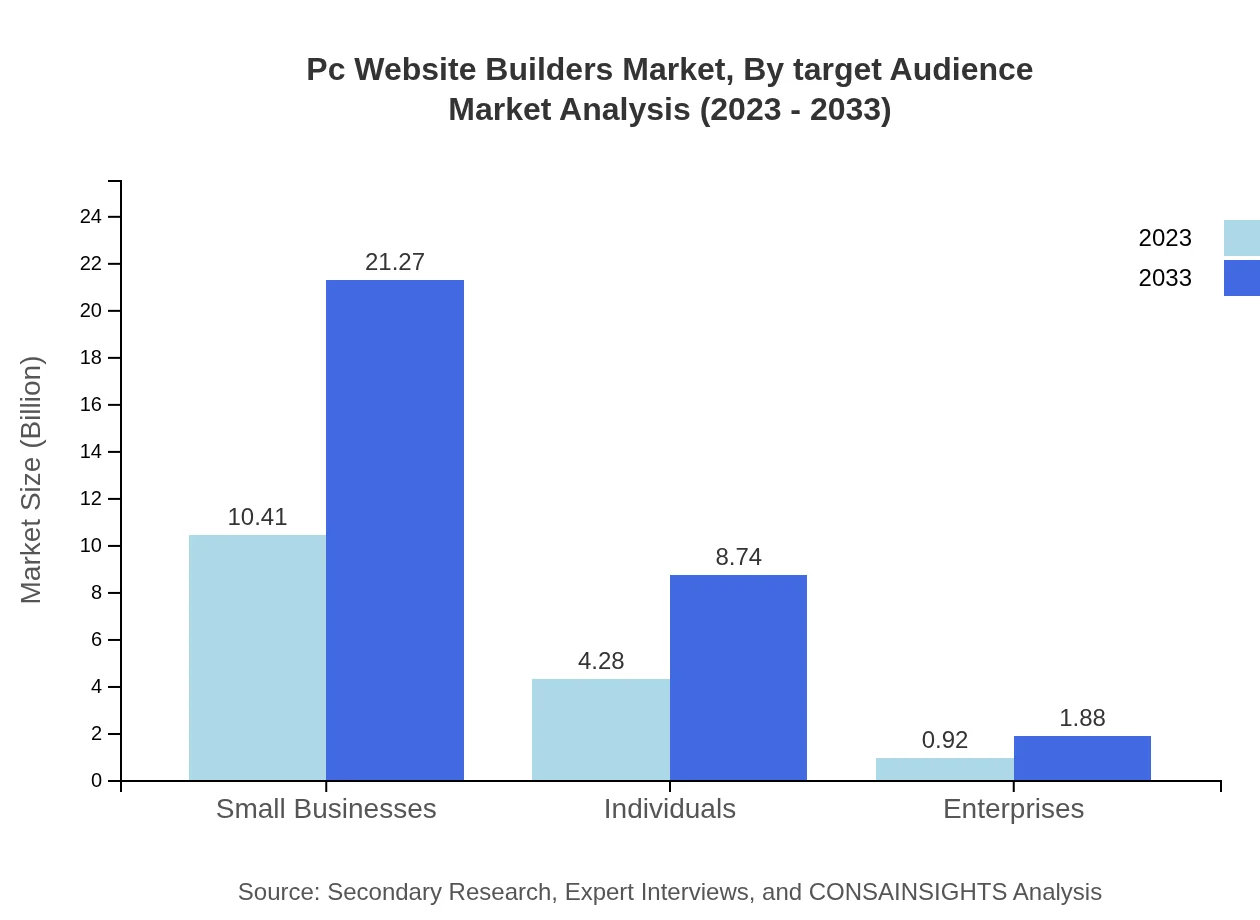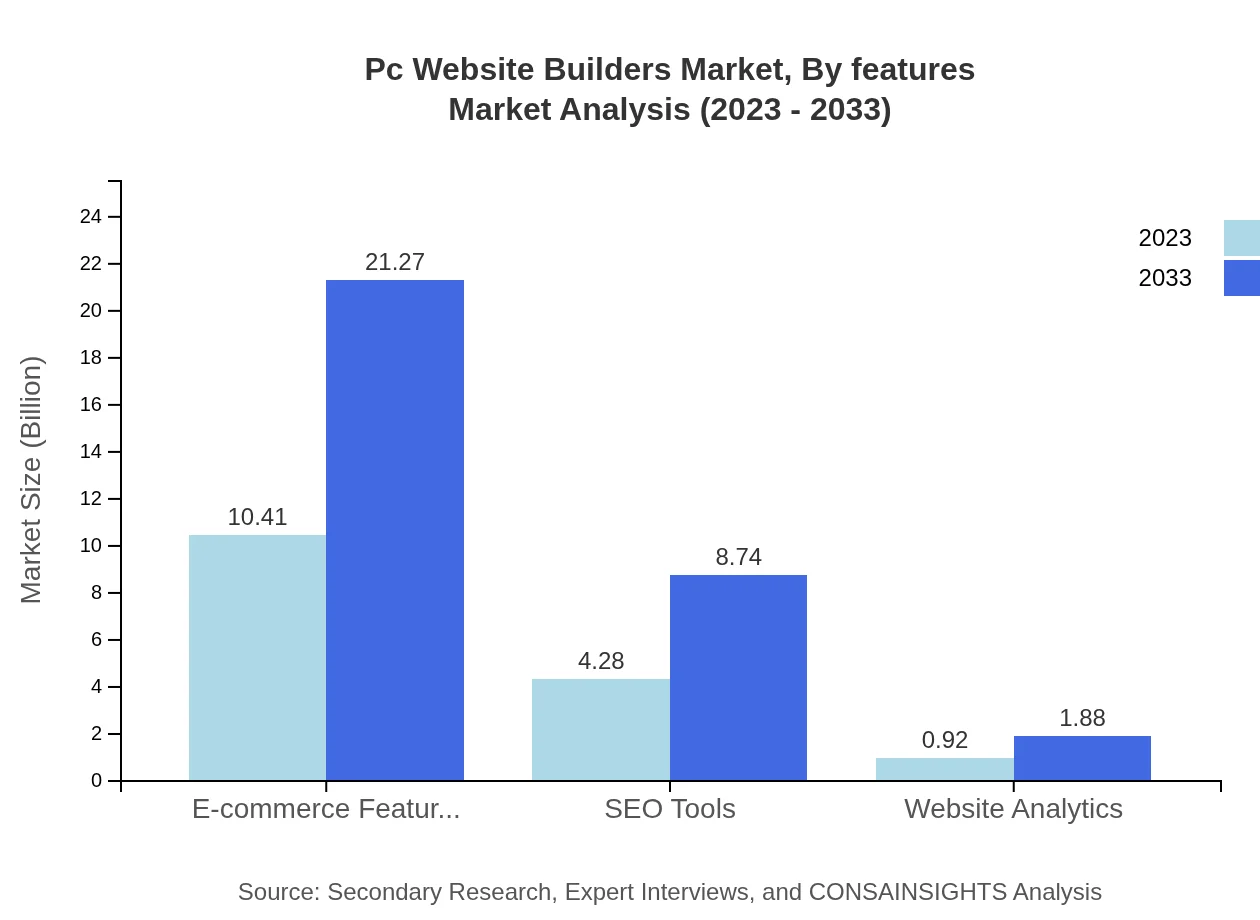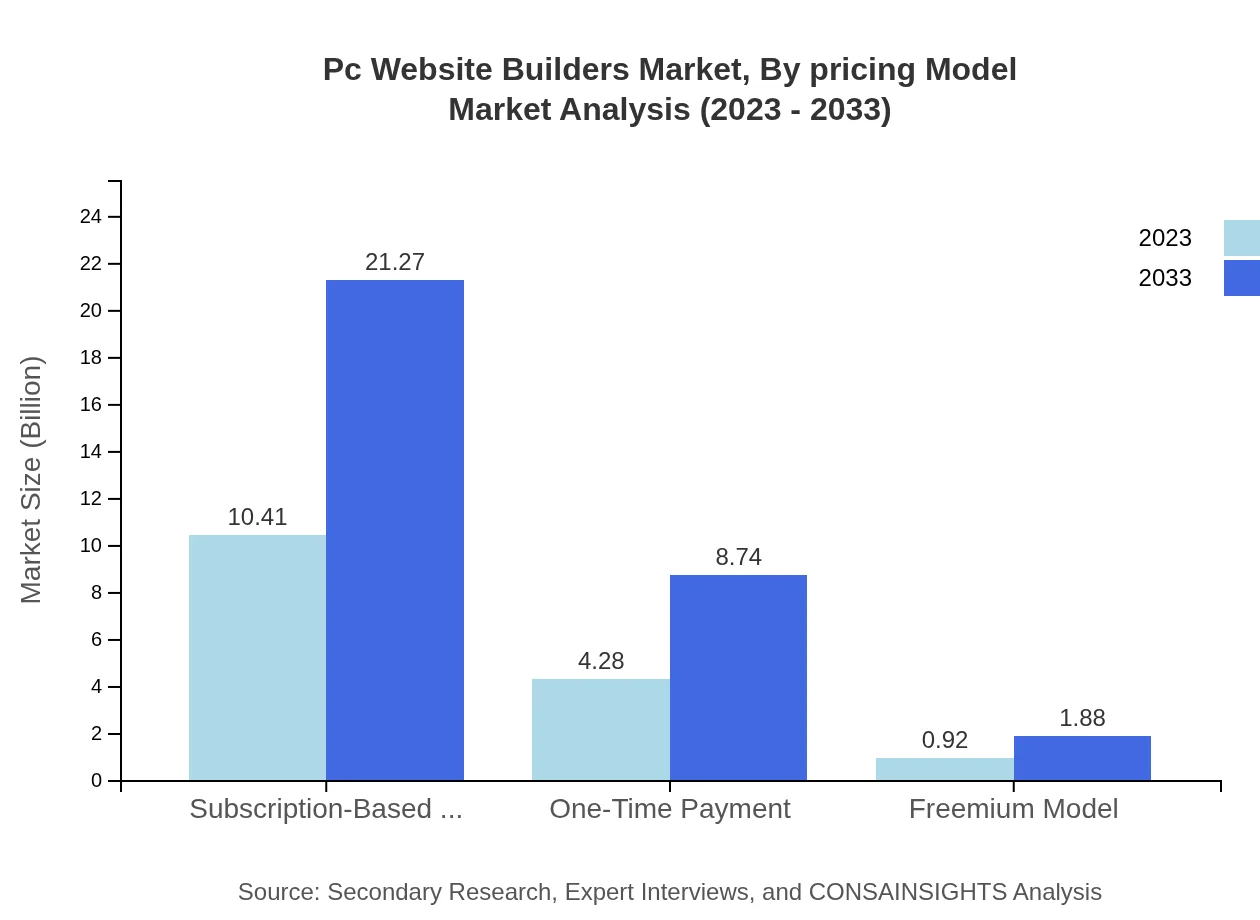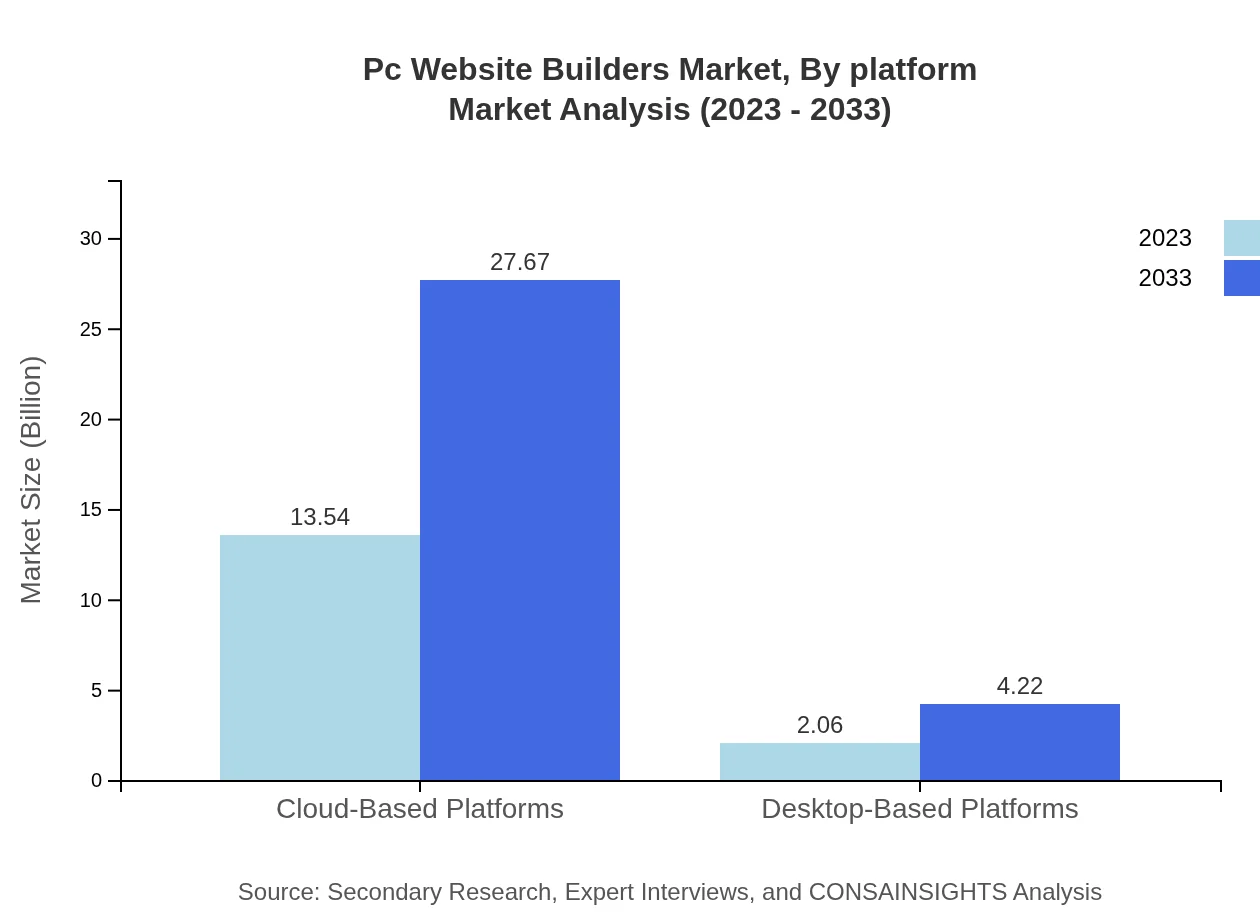Pc Website Builders Market Report
Published Date: 31 January 2026 | Report Code: pc-website-builders
Pc Website Builders Market Size, Share, Industry Trends and Forecast to 2033
This comprehensive market report provides in-depth insights into the Pc Website Builders industry from 2023 to 2033, covering market size, growth trends, segmentation, and key players. The analysis aims to equip stakeholders with the data needed for informed decision-making.
| Metric | Value |
|---|---|
| Study Period | 2023 - 2033 |
| 2023 Market Size | $15.60 Billion |
| CAGR (2023-2033) | 7.2% |
| 2033 Market Size | $31.89 Billion |
| Top Companies | Wix, Squarespace, Weebly, Shopify, WordPress.com |
| Last Modified Date | 31 January 2026 |
Pc Website Builders Market Overview
Customize Pc Website Builders Market Report market research report
- ✔ Get in-depth analysis of Pc Website Builders market size, growth, and forecasts.
- ✔ Understand Pc Website Builders's regional dynamics and industry-specific trends.
- ✔ Identify potential applications, end-user demand, and growth segments in Pc Website Builders
What is the Market Size & CAGR of Pc Website Builders market in 2023?
Pc Website Builders Industry Analysis
Pc Website Builders Market Segmentation and Scope
Tell us your focus area and get a customized research report.
Pc Website Builders Market Analysis Report by Region
Europe Pc Website Builders Market Report:
In Europe, the market shows robust potential, predicted to grow from $4.27 billion in 2023 to $8.73 billion by 2033. The region is characterized by strong demand for customizable website solutions and stringent data protection regulations, which drive companies to seek compliant platforms.Asia Pacific Pc Website Builders Market Report:
In the Asia Pacific region, the market for Pc Website Builders is expected to grow from $2.95 billion in 2023 to $6.04 billion by 2033, driven by rapid digital transformation and an increase in internet penetration. Countries like India and China are at the forefront of this growth, with a burgeoning number of startups and SMEs seeking cost-effective website solutions.North America Pc Website Builders Market Report:
North America remains the largest market for Pc Website Builders, with an estimated size of $6.04 billion in 2023, expected to reach $12.34 billion by 2033. The region's advanced technological infrastructure and high digital adoption rates are critical factors contributing to this growth.South America Pc Website Builders Market Report:
The South American market is smaller, with revenues projected to rise from $0.31 billion in 2023 to $0.63 billion in 2033. This growth is primarily propelled by improved connectivity and a growing emphasis on e-commerce, particularly in Brazil and Argentina.Middle East & Africa Pc Website Builders Market Report:
The Middle East and Africa’s Pc Website Builder market is projected to expand from $2.03 billion in 2023 to $4.15 billion in 2033. This growth can be attributed to the increasing digitalization efforts and government initiatives aimed at promoting e-commerce and digital entrepreneurship.Tell us your focus area and get a customized research report.
Pc Website Builders Market Analysis By Type
The market can be analyzed across various types of builders. Drag-and-drop builders lead with a market size of $10.41 billion in 2023, expected to surge to $21.27 billion by 2033. Conversely, template-based builders start at $4.28 billion and are projected to grow to $8.74 billion, while code-based builders represent a smaller share, starting at $0.92 billion and anticipated to reach $1.88 billion by 2033.
Pc Website Builders Market Analysis By Target Audience
In terms of target audience, small businesses dominate the segment with a size of $10.41 billion in 2023 and projected to double by 2033. Individuals follow with $4.28 billion growing to $8.74 billion while enterprises begin with $0.92 billion and expect modest growth to $1.88 billion by 2033.
Pc Website Builders Market Analysis By Features
The feature sets offered by website builders are crucial for user adoption. Key features include e-commerce capabilities ($10.41 billion in 2023 growing to $21.27 billion) and SEO tools ($4.28 billion to $8.74 billion). Website analytics also contribute significantly, with anticipated growth from $0.92 billion to $1.88 billion over the forecast period.
Pc Website Builders Market Analysis By Pricing Model
Cost models in this space also play an important role in market dynamics. Subscription-based models, which start at $10.41 billion in 2023, are expected to rise to $21.27 billion. One-time payment models are also lucrative, beginning at $4.28 billion and reaching $8.74 billion by 2033, while freemium models are expected to maintain smaller revenues with projected growth from $0.92 billion to $1.88 billion.
Pc Website Builders Market Analysis By Platform
Platforms are another key aspect of the market. Cloud-based platforms dominate, starting at $13.54 billion in 2023 and growing to $27.67 billion by 2033, while desktop-based platforms, though smaller, are expected to grow from $2.06 billion to $4.22 billion.
Pc Website Builders Market Trends and Future Forecast
Tell us your focus area and get a customized research report.
Global Market Leaders and Top Companies in Pc Website Builders Industry
Wix:
Wix is a leading website builder platform offering a multitude of customizable templates and an intuitive drag-and-drop interface, appealing to both new users and experienced developers.Squarespace:
Known for its design-oriented approach, Squarespace provides powerful website building tools, particularly for creatives and e-commerce businesses seeking stunning visuals.Weebly:
Weebly focuses on simplicity with its drag-and-drop features and is widely popular among small businesses looking to establish an online presence quickly.Shopify:
Shopify is best known for its e-commerce capabilities, allowing users to easily create online stores with various integrations and customizations.WordPress.com:
As a well-established player, WordPress.com offers extensive flexibility with a vast range of plugins and themes, catering to a diverse user base.We're grateful to work with incredible clients.









FAQs
What is the market size of pc Website Builders?
The global market size for PC website builders is projected to reach $15.6 billion by 2033, growing at a CAGR of 7.2%. This growth reflects increasing demand for user-friendly, customizable websites among businesses and individuals.
What are the key market players or companies in this pc Website Builders industry?
Key players in the PC website builders industry include Wix, Squarespace, WordPress.com, Weebly, and Shopify. These companies dominate the market by offering versatile platforms catering to diverse user needs, including e-commerce solutions and extensive template options.
What are the primary factors driving the growth in the pc Website Builders industry?
The growth of the PC website builders industry is driven by increasing digitalization, demand for e-commerce solutions, and the need for small businesses to establish an online presence. Additionally, advancements in technology and user-friendly interfaces continue to attract users.
Which region is the fastest Growing in the pc Website Builders?
The fastest-growing region in the PC website builders market is North America, projected to expand from $6.04 billion in 2023 to $12.34 billion by 2033. Europe and Asia Pacific are also experiencing significant growth, fueled by rising internet penetration.
Does ConsaInsights provide customized market report data for the pc Website Builders industry?
Yes, ConsaInsights offers customized market report data tailored to specific needs within the PC website builders industry, providing in-depth insights and analyses that cater to various market segments and geographical areas.
What deliverables can I expect from this pc Website Builders market research project?
Deliverables from the PC website builders market research project include comprehensive reports, market size and growth forecasts, competitive analysis, trend identification, and actionable insights tailored to your strategic needs.
What are the market trends of pc Website Builders?
Market trends in PC website builders include a shift towards cloud-based platforms, increased focus on mobile optimization, the rise of e-commerce features, and the growing popularity of subscription-based models, indicating evolving user preferences.

